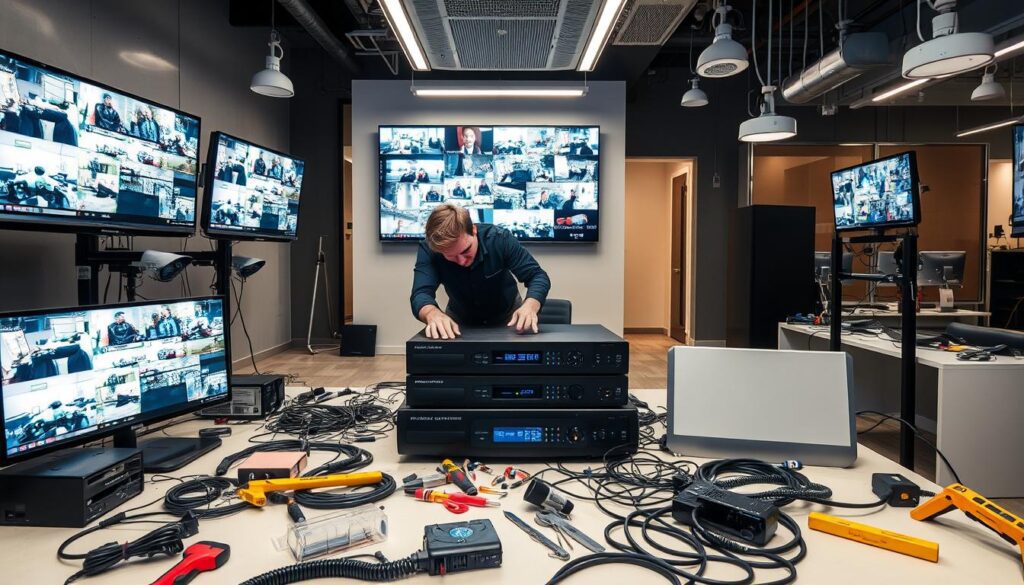DVR vs NVR. Selecting between a DVR and an NVR is crucial in technology for surveillance. Both record videos, but they have different settings and technologies. It’s vital to understand these distinctions before selecting the appropriate system for your security needs.
The DVR vs NVR issue is essential to current security systems. Recognizing the basis of both may help you make a sensible choice.
DVR and NVR are the two basic choices in surveillance technology. The appropriate alternative is decided by the system’s architecture, functionality, and intended application. By taking into the variations and benefits, you may select the suitable solution for your requirements.
It’s crucial to choose an excellent video surveillance system. It impacts the security and efficiency of your system. Examine the attributes of DVR and NVR systems to get the most out of your Investing money in safety equipment.
Recognizing the distinctions between DVR and NVR is important while growing a new system or improving an already-existing one.
Important Takeaways
- To choose the ideal system for video surveillance for what you need, It is important to recognize the differences between systems for DVR and NVR.
- The perks and usages of DVR and NVR systems differ because of their unique designs and capabilities.
- The decision between DVR and NVR depends on your certain security needs and your necessary level of surveillance technologies.
- When deciding between systems for digital and network video recording, It is quite important to think about their corresponding benefits and drawbacks.
- Acquiring a suitable video surveillance system can make a considerable impact in your system’s complete efficacy and security.
- Maintaining the newest advances in DVR and NVR systems may help you select the best selection for your purposes as surveillance technology is continually improving.
Understanding DVR and NVR Basics
Digital Video Recorders and Network Video Recorders are key in video surveillance. Knowing how they work with security cameras and ip cameras is crucial. It’s important to compare these systems to see their differences in technology and function.
DVR systems connect security cameras directly to the recorder. This recorder processes and stores the video. NVR systems, however, use ip cameras that send video to the recorder. The recorder then processes and stores it. This difference affects the system’s performance, scalability, and flexibility.
- Video quality and resolution
- Camera compatibility and connectivity options
- Storage capacity and data management features
- Remote access and monitoring capabilities
You may choose the system that best matches your wants by being aware of these elements. Make sure the DVR vs NVR you purchase is compatible with your IP and security cameras. This provides a surveillance system that is both dependable and effective.
The Key Features of DVR vs NVR Systems
Making the option between a network video recording system and a digital video recorder is vital. Each has merits and cons of its own. Your security requirements will determine the best option. DVRs are renowned for being dependable, expandable, and simple to operate. They are popular with many users.
NVR systems, however, offer flexibility, high-definition video, and remote access. They are perfect for those needing advanced security features.
DVR systems are renowned for being inexpensive to maintain and simple to install. On the other hand, NVR systems offer sophisticated analytics features together with high-definition video quality. Here are some of each’s salient characteristics:
- DVR systems: analog camera support, local storage, and limited remote access
- NVR systems: IP camera support, cloud storage, and advanced remote access capabilities
Your demands will determine whether to employ a DVR vs NVR. You may make an informed decision by weighing the pros and qualities of each. This guarantees you’ll obtain the ideal system for your security requirements.
| System Type | Key Features | Benefits |
|---|---|---|
| DVR | Analog camera support, local storage | Easy installation, low maintenance costs |
| NVR | IP camera support, cloud storage, advanced analytics | High-definition video quality, advanced remote access capabilities |
Camera Compatibility and Requirements
DVR vs NVR. Examining camera compatibility is crucial while picking between DVR and NVR systems. Because IP cameras deliver high-quality video and features like motion detection, they are suitable for NVR systems. Analog cameras, utilized by DVR systems, are less expensive than IP cameras but don’t create as excellent of a video.
Analog and IP cameras offer different picture quality and resolutions. For thorough footage, security cameras with high-quality images, such as 1080p or 4K, are preferable. This is important for applications needing top-notch video. Here’s a comparison of ip cameras and analog cameras:
| Camera Type | Resolution | Image Quality | Features |
|---|---|---|---|
| IP Cameras | Up to 4K | High | Motion detection, night vision, weather resistance |
| Analog Cameras | Up to 720p | Lower | Basic video recording, limited features |
When comparing DVR vs NVR systems, camera choice is key. Security cameras work with both, but ip cameras fit better with NVR systems. Think about your surveillance needs to decide on the right camera and system.
Installation and Setup Considerations
Thorough preparation is important before the deployment of a surveillance system. The Installation is affected by the kind of surveillance apparatus being released, like DVR vs NVR systems. Crucial components comprise the necessary number of security cameras, cable length, and power source.
Here are key factors to consider for a successful installation:
- Camera placement and field of view
- Cable length and type
- Power supply and backup options
- Network configuration and connectivity
A well-planned installation avoids problems and ensures the surveillance technology works right. Working with a skilled installer is crucial. This way, security cameras are set up to protect effectively.

By planning and executing the installation well, you can protect your property. This ensures a safe and secure environment.
| Factor | Consideration |
|---|---|
| Camera Placement | Field of view, lighting, and weather resistance |
| Cable Requirements | Length, type, and connectivity options |
| Power Supply | Primary and backup power options, including batteries and generators |
Video Storage and Management Options
Storage and management are key when it comes to digital and network video recorders. The system’s performance is influenced by the storage type. We’ll examine how much storage you need, the advantages and disadvantages of local and cloud storage, and data management choices for both kinds of systems.
Numerous factors influence the decision between local and cloud storage. These consist of the system’s dimensions, the amount of video you must save, and the level of accessibility you desire. While cloud storage is more adaptable and expandable, local storage offers you greater control. For instance, a small business might choose local storage with a digital video recorder. On the other hand, a big company might go for cloud storage with their network video recorder.
Storage Capacity Requirements
The resolution, frame rate, and cameras you have will determine how much storage you require. Higher frame rates and resolutions require more storage. To prevent data loss and maintain system functionality, it’s critical to determine your storage requirements.
Data Management Features
Good data management is crucial for both digital and network video recorders. This includes features like automatically deleting old footage, compressing data, and secure access controls. These features help use storage space wisely and keep your data safe. A well-managed system lets you focus on your main tasks, knowing your video footage is secure and easy to find.
In summary, the storage and management options for digital and network video recorders are vital. Utilizing efficient data management solutions, finding out your storage requirements, and grasping the distinctions between local and cloud storage are crucial. In this approach, you may maximize the efficiency and dependability of your system.
Cost Analysis and Budget Considerations
DVR vs NVR. Choosing between DVR and NVR systems means looking at the cost and budget. The quantity of cameras and recorders can greatly impact the starting price. The price of a camera might vary greatly from several hundred to several thousand dollars, based on its features and construct quality.
Creating the majority of your system is aided by having a sound financial plan. Think about the ongoing costs like maintenance and upgrades. Also, consider the system’s features like storage, resolution, and remote access. These can affect the total cost and your budget.

Important things to think about when comparing DVR vs NVR costs include:
- Initial investment requirements
- Long-term operating costs
- Return on investment factors, such as increased security and potential cost savings
- Features and benefits of each system, including storage capacity, resolution, and remote access
By carefully looking at these points and your specific needs and budget, you can choose the best video surveillance system for you.
Security and Remote Access Capabilities
Security is key in surveillance technology. Features to protect your footage are included in both DVR vs NVR systems. Passwords and encryption are essential for safeguarding your cameras and recordings.
Many systems today let you access footage remotely. This is great for businesses or anyone who needs to check on their property from afar. Thanks to new tech, accessing your footage is now easier and safer.
When looking at a surveillance system, consider these important features:
- Secure remote access protocols
- Encryption methods
- Password protection and user authentication
- Regular software updates and security patches
Choosing a system with strong security and remote access is smart. It keeps your footage safe and lets you access it easily. Surveillance tech is vital for protecting your home or business.
In Conclusion: DVR vs NVR
DVR vs NVR. Making a decision is difficult between a DVR and an NVR for your video surveillance. Each has advantages and considerations of its own. You have a choice of what’s greatest for you by being conscious of the differences in camera use, storage, security, and price.
Discovering the ideal match is crucial, regardless of whether you go with an NVR for its advanced capabilities or a DVR for its reliability. Verify that your system satisfies your requirements for expansion, security, and access. You can decide on the top technology to protect your possessions and provide you with mental tranquility by taking into your needs and the solutions that are accessible.
FAQ
What does a DVR system differ from an NVR system?
Analog cameras utilize DVR systems which record footage on the DVR itself. In contrast, an NVR system takes benefit of IP cameras. It records video on a network server or in the cloud.
What are a DVR system’s main benefits?
DVR systems are less expensive and simpler to install. They work well with old analog cameras. Plus, they store video locally and don’t need a strong network.
What are the key advantages of an NVR system?
NVR systems have better video quality and remote access. They also offer more camera placement options. Plus, they make it easy to manage and access video footage.
How do the camera requirements differ between DVR and NVR systems?
DVR systems use analog cameras. NVR systems use IP cameras. In contrast to analog cameras, IP cameras have more functionality and are of greater quality.
What is important to consider into consideration when setting up and configuring DVR and NVR systems?
DVR systems are easier to install. You just connect the cameras to the DVR. NVR systems need a more complex network setup. But, they offer more flexibility in camera placement.
How do the storage and video management options differ between DVR and NVR systems?
DVR systems store video locally. NVR systems can store video locally or in the cloud. Better data management functions, including as video analytics and remote access, are also available with NVR systems.
Which system is ultimately more economical?
Several variables affect how cost-effective DVR or NVR systems are. These consist of advanced features, storage requirements, and the number of cameras. DVR systems are initially less expensive. However, because of its remote management and adaptability, NVR systems may result in long-term cost savings.
How do DVR and NVR systems comparison in terms of security and features for remote access?
NVR systems have better security features like encryption and user authentication. They also offer remote access. This makes it easier to monitor and manage the system from anywhere, enhancing overall security and control.






